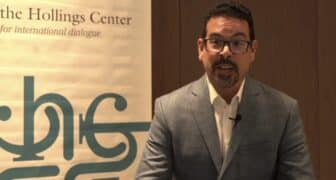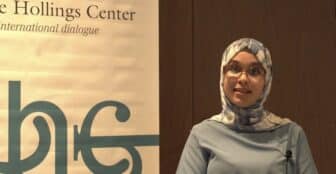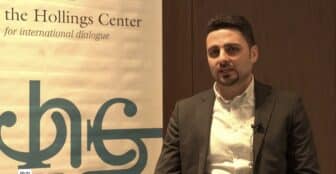Afghanistan’s Troubled Transition: Politics, Peacekeeping,
and the 2004 Presidential Election
Scott Seward Smith
Review and author interview by George Gavrilis, Executive Director of the Hollings Center
Please click here for a printer-friendly PDF version of this page.
Scott Seward Smith’s book masterfully covers the highs and lows of the United Nations mission in Afghanistan through a narrative that spans ten years and three elections. With clear-headed analysis and rich insider data, Smith explains how the United Nations succeeded in organizing elections and legitimizing the Karzai government under the most difficult of circumstances but failed to lay the foundations for future democracy in Afghanistan.
Afghanistan’s Troubled Transition begins with a unique glimpse into the role of the UN in Afghanistan and Pakistan in the late 1990s and its mediation efforts to end the Afghan civil war. Later chapters discuss a number of pivotal events in Afghanistan’s recent history—the Bonn agreement, the Emergency and Constitutional Loya Jirgas (Grand Councils), and the elections of 2004, 2005, and 2009. Smith’s chapters also detail the efforts of Afghans and the international community that went into making these events—from the Herculean task of registering millions of voters to convincing strongmen such as Rashid Dostum to disarm and take part in the elections. While the book credits many accomplishments in Afghanistan to the UN and to tireless personalities like Lakhdar Brahimi, it argues that the UN’s internal contradictions and the international community’s short-sighted efforts to prop up Karzai turned each and every electoral exercise into a political meltdown.
A substantial part of the book is focused on the United Nations Assistance Mission in Afghanistan (UNAMA), which sought to advance the terms of the Bonn agreement through logistical, administrative, and political hurdles. UNAMA staff navigated rubble-strewn roads and snowbound districts to set up regional offices, while at headquarters in Kabul, “tensions were high due to the physical proximity of stressed political officers,Bonn’s tight deadlines, and Brahimi’s exacting management style” (p. 27).
In organizing the Emergency Loya Jirga, UNAMA navigated innumerable political landmines, from international stakeholders who were incredulous that warlords were included, to President Hamid Karzai who was perpetually making political appointments to bolster his interim administration. Karzai increased the size of his cabinet to over thirty ministries, created two vice presidents, several national advisor positions, and a number of national commissions to accommodate his Pashtun political base. According to Smith, “even as Karzai entered the tent to announce parts of his cabinet at the final session, he was cornered by various leaders and, apparently, made last-minute changes to his list” (p. 35).
Campaign posters in lead-up to 2010 elections. Photo by George Gavrilis.
After the Loya Jirga, the UN set its sights on preparing for elections. The list of tasks was daunting: money had to be secured from international donors; roads had to be repaired and cleared; population data had to be compiled; district boundaries had to be affixed; electoral law had to be drafted; tens of thousands of electoral staff had to be hired and trained; and millions of voters had to be registered.
For some of these massive tasks, UN staff found minimalist solutions. For example, the UNAMA election team did a back-of-the-envelope calculation to estimate Afghanistan’s eligible voting population, partly by extrapolating the 1979 census. Other decisions were simply postponed, including the crucial decision of whether to hold presidential or parliamentary elections first. Afghan voter education teams were dispatched to the countryside to raise awareness but were unable to tell the public whether they would be electing a president or a parliament.
For Smith, the above logistical difficulties were only a backdrop to greater political problems. The book vividly describes the chasm that developed between UNAMA and the UN’s Electoral Assistance Division (EAD). For EAD, elections were a process, not an event. Their value was in gradually building political consensus and democratic behavior. For UNAMA, the first elections were planned as a culminating “free and fair” exercise in good democracy. As Smith sums it up:
“If all the money required was available immediately, and the Taliban cooperated with the registration plan, and the snowcap disappeared, and millions of Afghans quickly learned to read and write, and nothing that could go wrong did go wrong, the proposed timelines could possibly be met. Only in the best of all fictional worlds was the plan feasible…It wasn’t a plan, it was arithmetic.” (p. 109)
Afghan election staff count ballots on polling station floor. Photo by George Gavrilis.
The book covers Karzai’s 2004 victory at the ballot boxes, the 2005 parliamentary vote, and the domestic and international repercussions of these elections. Smith also presents the reader with a detailed discussion of the electoral debacle in 2009 and the controversy it ignited between UNAMA head Kai Eide and his deputy Peter Galbraith. Smith situates the dispute squarely within the book’s analytical context but weighs in with an insider’s view that will not make the Galbraith camp happy.
This book will make edifying reading for seasoned Afghanistan-watchers and non-specialists. Few people know that Afghanistan had a parliament in the 1960s that, in certain respects, functioned better than the current one. Even fewer readers will know that Afghanistan’s first female police officers were hired and trained to protect women’s voter registration teams, or that Afghanistan’s voter registration system was based on software developed for tiny Pacific Island states. Smith also explains the fascinating inside story of how Afghanistan unintentionally wound up with a Parliament that is over 25% female.
Despite its title, this book is far more than a take down of Afghanistan’s first post-Taliban election. It is a sobering story about the pitfalls of democratization, the impossibly short horizons of the international community, and the limits of even the most well-intentioned peacekeepers.
Q&A with Author
Scott Seward Smith, a consultant on elections and democratization, was formerly Afghanistan team leader in the UN Department of Peacekeeping Operations. He recently attended the Hollings Center’s Next-Generation Dialogue on U.S.-Afghan Relations.
George Gavrilis recently sat down with Smith to discuss Afghanistan’s Troubled Transition (available from First Forum Press).
Gavrilis: It seems that the book’s lesson is that in Afghanistan, doing less can often be more. Is that a fair statement?
Smith: It’s interesting that you draw that conclusion. I actually feel very strongly that doing less can be more in Afghanistan. It wasn’t a message that I focused on in writing the book, but I’m glad it came through. My very first experience in Afghanistan was running a humanitarian project for a French NGO in 1995. The civil war was going on and there was hardly any international attention to the place. I learned then to appreciate the knowledge and the capacity of Afghans. They had much better ideas about how to help their country than we did. And of course they were hugely stubborn when we wanted to do things that they didn’t think would work. We had no internet in those days and very little contact with the outside world. I remember reading articles about the Balkans in some of the outdated magazines that now and then filtered into Kabul. I remember reading about the aid that was being given to Bosnia and thinking it was unjust because just as many people were being killed in Kabul as were being killed in Sarajevo. And I remember thinking, if only we could get some international troops here and a little bit of financial support. As they say, be careful what you wish for.
But the corollary to “less is more”, is that the “less” in terms of resources and international staff has to be compensated with “more” in terms of internationals who understand Afghanistan. This is easier said than done. The problem is that the Afghanistan that we built after 2001 is a rather different Afghanistan than what existed before. Many Afghans don’t even understand it. I remember an expert once saying about Karzai that he was playing the tribal game he learned on his grandfather’s knee, but the problem was that the rules had changed.
Gavrilis: As I read the book, I felt anxiety about all the crushing responsibilities and deadlines the UN faced. What was it like to be on the staff of UNAMA?
Smith: Now here’s a point that I did intend to convey. One of the main themes that I was trying to get across was the lack of coherence between decisions that seemed to be taken almost breezily at the political level, but without much thought given to the realities on the ground. Much of the anxiety that comes through is that of mid-level technical experts working like crazy to meet political demands that, at a certain point, didn’t make much sense. You quote in your review one of these moments, when I say that it wasn’t a plan it was just arithmetic. What bothers me is not so much the fact that these political decisions are taken, but that there is a huge resistance to these decisions being revised once it is clear that they are unrealistic. I describe what I call fetishism over the Bonn timeline: Once certain events had been held according to the timetable, there was a belief that if any future deadlines were missed, the whole process would fall apart. I found this to be tremendously short-sighted.
I end my book by saying that I have told the story from an international perspective, but we also need the Afghan perspective. I refuse to believe that Afghanistan is ungovernable, that Afghans are incapable of living with each other under some form of political order, or that the country is destined to perpetual civil war. But the comportment of this generation of Afghan leaders makes it harder and harder to make the optimistic argument. They have squandered an opportunity of world-historical proportions, and this will make it far easier for the international community to leave under irresponsible but ultimately understandable conditions.
In short, what has changed over time from the perspective of a UNAMA staff member is the sense that once you felt you were putting your life at risk for a project that offered a better future for a people that desperately deserved it. Now, you feel that you are part of an enabling mechanism for a political class that has lost its legitimacy. That is hard on morale.
Gavrilis: Afghanistan has been in the news a lot lately: the killing of UN staff in Mazar-e Sharif, the ongoing saga of the 2010 Parliamentary elections, and political assassinations. How do these affect what the UN can do in Afghanistan?
Smith: I think that the UN role in Afghanistan now is somewhat diminished. The “transition” plan that was negotiated between ISAF and the Afghan government, and that was agreed to by ISAF heads of state at the Lisbon summit last November, is, I believe, a pretty coherent plan and the best chance to achieve something that resembles success in Afghanistan. But it is largely an ISAF-driven plan. In addition, in 2009 and 2010 the UN had to take decisions on elections that angered President Karzai, who marginalized UNAMA. I think in both elections the UN did what it had to do, but the fact is that we have paid a cost for it in terms of political influence.
The UN now faces a huge dilemma. In the aftermath of the Mazar attack, many UN staff I spoke to said that the problem was that we have built walls high enough to isolate us from the Afghan people but not strong enough to protect ourselves against attackers. For whatever reason, the UN has become a target of the insurgency and neither the Afghan security forces nor ISAF have proven able or willing to protect the UN when it is attacked. Before Mazar there was Herat, where luckily there were no casualties. And before Herat was the Bakhtar guest house attack in Kabul in October 2009, where five internationals were killed. The question forming in the mind of many UN staff, especially those who have been in Afghanistan a long time, is whether the value they add is worth the risks that they face. The value they add depends on access to the population, but access to the population increases the risks that they face. It is a very difficult dilemma that is not made easier by the Afghan government’s fairly constant criticisms of the UN.






